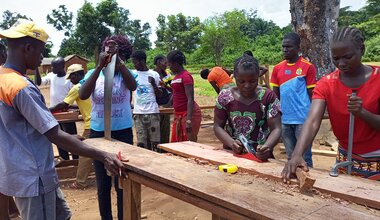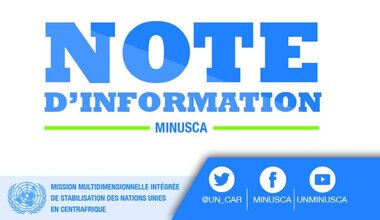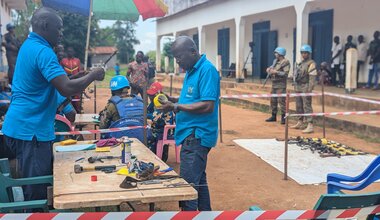United Nations Report on Violence in Bangui September – October 2015: Urgent Steps Needed to Prevent Impunity for Grave Violations of Human Rights
A United Nations report to be released later this month details grave violations and abuses of human rights committed following the eruption of violence in Bangui, capital of the Central African Republic, from 26 September to 20 October 2015. This period was marked by the targeting and killing of civilians, and widespread looting and burning of houses and property, among other human rights violations.
This press statement comes at a critical time for the Central African Republic, shortly before legislative and presidential elections on 14 February 2016. The Head of MINUSCA, the Special Representative of the Secretary-General, Parfait Onanga-Anyanga, calls on all actors to support the electoral process, to reject all forms of violence, and to respect the results of the polls. Peaceful and legitimate elections will mark a major step towards reconciliation, justice and sustainable peace in CAR.
In compiling this report, MINUSCA investigators documented multiple human rights violations including at least 41 civilians killed and at least 17 injured; instances of rape and other forms of sexual violence; kidnapping and unlawful detention; and the pillaging, looting and destruction of property. The report quotes extracts from the testimony of witnesses and victims. MINUSCA also observed and documented the widespread and systematic looting and destruction of property, including the burning of many houses and theft of humanitarian resources, such as medical equipment, from intergovernmental organizations and NGOs. In the aftermath of the crisis, investigations were constrained by ongoing insecurity and restrictions on movement, particularly in predominantly Muslim areas of Bangui, so the actual number of casualties and violations is likely to be far higher than that detailed in the report.
While the majority of violations and abuses were committed by the anti-Balaka and ex-Séléka armed groups and their affiliates, the report also details human rights violations committed by members of the CAR armed forces. The weakness of State authorities in Bangui, and their widespread absence outside Bangui, means there is a serious risk that those responsible for human rights violations will enjoy impunity. The violence in Bangui also set-off a series of violent incidents throughout the Central African Republic, including Bambari, Kaga-Bandoro, Bouar, Carnot and Sibut.
SRSG Parfait Onanga-Anyanga calls on the Central African authorities, armed groups and the international community to implement a series of recommendations in to prevent future violations of human rights, and to take effective action in the fight against impunity. The Head of MINUSCA expressed concern “that the perpetrators of grave violations of human rights will enjoy impunity, and the Central African authorities must take effective action to ensure that those responsible for the crisis are brought to justice”. He reiterated the UN’s commitment to improving the administration of justice.
The report’s recommendations include, inter alia: ending impunity and prosecuting those responsible for past and present serious human rights violations and abuses; the end of attacks on civilians by armed groups; and the reform of the CAR armed forces. In addition, the report calls for the implementation of robust and effective programs of disarmament, demobilization and reintegration (DDR) and community violence reduction (CVR); protection and assistance to victims of sexual and gender-based violence; and increased financial and technical support from the international community for the establishment and functioning of the Special Criminal Court for CAR.
On 30 September 2015, the Prosecutor of the International Criminal Court, Fatou Bensouda, expressed great concern at the upsurge in violence in Bangui. Ms Bensouda warned that anyone committing crimes within the jurisdiction of the Court could be held individually accountable. In a separate statement, Ms Bensouda highlighted the forthcoming elections in the Central African Republic, saying: “The process of gathering evidence against any person who incites or engages in acts of mass violence before, during and after the elections is continuing. Such acts are serious crimes, which the ICC has jurisdiction to deal with.”
MINUSCA will also share the findings of its investigations with the ICC and with the Special Criminal Court for CAR, which will be established in the near future.
Contacts
Musa Gassama, Head of MINUSCA Human Rights division and Representative of the OHCHR
Tel: +236 75265072
E-mail: gassama@un.org
 ONU
ONU Nations Unies Maintien de la paix
Nations Unies Maintien de la paix




